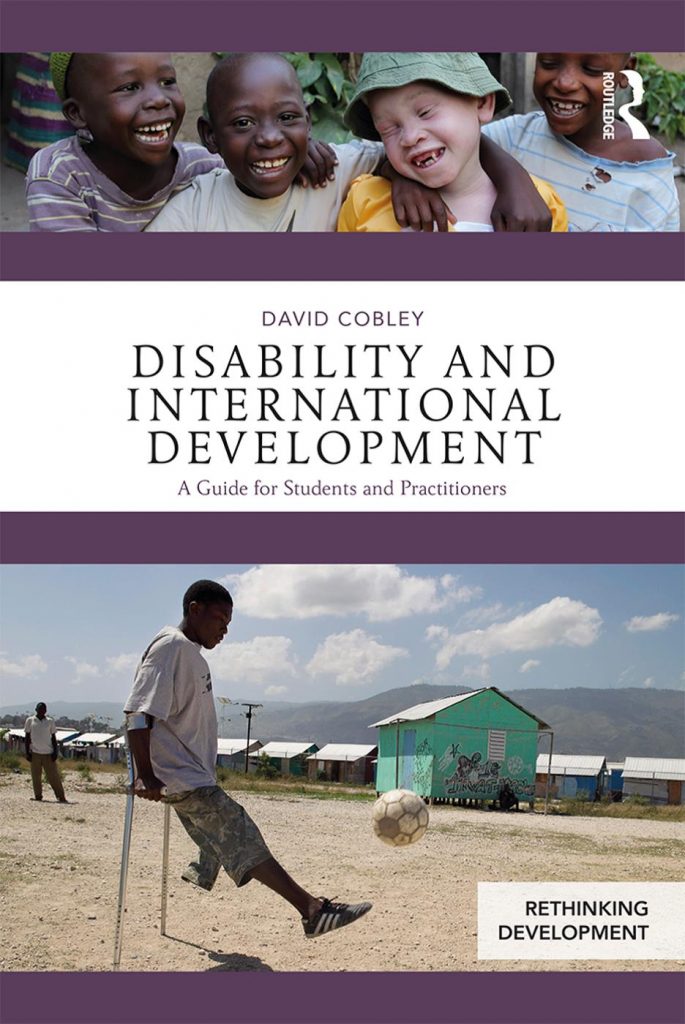David Cobley has worked as a practitioner in the field of disability service provision, mainly within the UK context, for the past 30 years. Over the past 10 years, David has combined his practitioner role with an academic role at IDD, initially as a student and then as researcher and teacher. His PhD thesis focused on disability and livelihoods in Kenya and India, and he has also conducted research on disability in Uganda, Sierra Leone and The Philippines.
Disability is fast becoming a priority issue within the international development arena. The post-2015 Sustainable Development Agenda, for example, clearly acknowledges that its bold pledge to ‘leave no one behind’ cannot be honoured unless full account is taken of the needs, experiences and priorities of disabled people, who constitute the world’s largest minority group. This is highlighted through several explicit references to disability among the targets and indicators that accompany the sustainable development goals, in stark contrast to the Millennium Declaration’s silence on disability. Increased levels of attention to disability can largely be attributed to the efforts of the international disability movement, which has long campaigned for disability to be viewed from a human rights perspective, rather than from a welfare or charity perspective, and was heavily involved in the drafting of the 2006 United Nations Convention on the Rights of Persons with Disabilities (CRPD), the first major human rights treaty of the 21st century. The CRPD has now been ratified by 176 state parties across the globe, with many governments following up on ratification by introducing legislative measures, policies and programmes that are designed to protect and promote the rights of disabled people to full participation in society.
International development agencies have also started to respond to the challenge of working towards disability-inclusive development. In the UK, for example, the Department for International Development has produced a new disability framework, outlining its plans to mainstream disability into all aspects of its work, and will be hosting its first ever global summit on disability in July. The academic world, however, has been slow to catch up. The International Development Department at the University of Birmingham is still one of very few academic institutions in the UK to offer a postgraduate module on disability as part of its international development programmes. This will surely change, however, as the need to equip development practitioners of the future with the necessary skills and knowledge to work in more inclusive ways becomes ever more apparent.
 The need for an accessible introductory textbook, designed to support students and researchers that are relatively new to the emerging field of disability and international development, has become increasingly apparent to me over the past five years, as I have delivered my module on disability to international development students in Birmingham. In writing this new book, entitled ‘Disability and International Development: A Guide for Students and Practitioners’, I have tried to address this need by providing readers with a detailed overview of key themes, supplemented by concise chapter summaries, reflection exercises, discussion questions and suggested further readings. Topics covered include understanding and measuring disability, the relationship between disability and poverty, the growth of the international disability rights movement (with a particular emphasis on the issues and challenges facing disabled people’s organisations), health and rehabilitation, access to education, economic participation, disaster recovery and approaches to researching disability. There is a strong focus on the various ways in which theoretical perspectives can inform inclusive approaches to policymaking and programme implementation, drawing on case studies from existing literature and my own research experiences. It is to be hoped, therefore, that the book will be of value to policymakers and practitioners working in the development sector, as well as to students and researchers.
The need for an accessible introductory textbook, designed to support students and researchers that are relatively new to the emerging field of disability and international development, has become increasingly apparent to me over the past five years, as I have delivered my module on disability to international development students in Birmingham. In writing this new book, entitled ‘Disability and International Development: A Guide for Students and Practitioners’, I have tried to address this need by providing readers with a detailed overview of key themes, supplemented by concise chapter summaries, reflection exercises, discussion questions and suggested further readings. Topics covered include understanding and measuring disability, the relationship between disability and poverty, the growth of the international disability rights movement (with a particular emphasis on the issues and challenges facing disabled people’s organisations), health and rehabilitation, access to education, economic participation, disaster recovery and approaches to researching disability. There is a strong focus on the various ways in which theoretical perspectives can inform inclusive approaches to policymaking and programme implementation, drawing on case studies from existing literature and my own research experiences. It is to be hoped, therefore, that the book will be of value to policymakers and practitioners working in the development sector, as well as to students and researchers.
The book was published by Routledge on 12th March 2018 and is available in hardback, paperback and ebook formats. It includes a foreword written by Professor Tom Shakespeare, a prominent academic , broadcaster and disability rights campaigner who has played a leading role in raising the profile of disability on the international stage, not least through his work in co-authoring and helping to launch the first ever World Report on Disability, jointly published by the World Health Organisation and World Bank in 2011.
